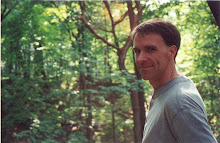
9/11 was a time of somber reflection for many, and I also turned inward. I had focused during those trips to the Midwest on many things: Hopper, art, travel, the towns, but mainly isolation. After the attacks, people were less isolated. They made eye contact. They had a need to heal, to bond, to feel a connection, to overcome isolation. Because of my Hopper project, I saw it as a need to recognize that we had put up invisible walls.
My theory about Hopperesque isolation was that we all held a secret inner self that no one else was privy to, and one lesson of 9/11 was how differently it affected people internally. Immediately after, some people cited the United States's isolation as one reason people from other cultures might want to attack us. But many voices at that time shouted down anyone who even suggested the United States could do anything better. Lost in the government's overzealous response were calls to use the attacks as a lesson to become a better (less isolated) global citizen. While many felt that we should be questioning ourselves, others felt we should be holding others accountable, and warmongering grew. As much as the attacks united us, the debate about how our government should respond to them divided us. Warhawks were screaming louder than Nighthawks.
* * * 
Isolation such as in Hopper's paintings is associated with the U.S., but isolationism is a political philosophy associated with us. After all, we're the country that spawned the party called the "Know-Nothings." Early in our history, the Monroe Doctrine posited that we would not interfere in other country's doings. We stayed out of international affairs until the turn of the 1900s. We only got into World War I because the Germans torpedoed American ships. Despite the later nationalism spawned by World War II, people forget that over half of the American populace felt that we should stay out of that war. Nighthawks, Hopper's most famous piece, was painted after the attacks on Pearl Harbor.
Nighthawks, Hopper's most famous piece, was painted after the attacks on Pearl Harbor. 
I had stumbled onto a parallel I didn’t want. Maybe the people in the café were so alone with their thoughts and yet gathered with others just to heal from that attack. And what did it say that the feeling that Nighthawks gave so resonated with viewers and seemed so reflective of the U.S.? Are we a nation defined by the feeling of being wronged? Are we isolated to try to protect ourselves from being attacked? Or maybe the context of that iconic painting implies that we are seen as a nation always ready for a war.
* * *
I had heard from that woman in Kansas City and from others their thoughts and feelings about American isolation, how it might be detrimental, and how it might be overcome. I tried to report on what Americans had told me they felt about isolation and isolationism, but discourse after 9/11 was painted as un-American. I felt marginalized, unheeded. I questioned whether and why I should continue with this project, especially because I worried that the answers I was getting would change and be skewed by this historically unique event.
I had a unique personal relationship to isolation that I had to confront, and (perhaps subconsciously) that was what I was doing with this project. In my own family, I was often overlooked. I had been an accident, an unplanned pregnancy for my Catholic parents who already had four children to feed, and I was born nine months after my father's mother died, so he always associated me with her death and ignored me. My older sisters, however, played teacher with me when they got home from school, and they taught me how to read before I showed up at kindergarten. Upon learning this, my instructor put me at the back of the room reading books while the rest of the class learned as a group from primers. This academic ability eventually led to me attending a prep school from tenth to twelfth grades, where I was isolated from the rest of the world in an idyllic countryside setting. My roommate was sent home early, and I lived alone in dorm rooms throughout prep school and opted for a single room in college as well. I graduated from college with a degree in a major that only nine other people graduated in that year. When I got out, I was a starving artist in a society that mocked them. When I "settled down" and got my day-job editing medical texts, I did not feel a part of that workaday culture. I also had a series of failed romances and trips abroad that left me feeling estranged from individual people and my society in general. I needed to come to terms once and for all with what I felt about isolation and why there was so much in my life and my culture.
20090331
199 Isolationism: The Personal is the Political
Subscribe to:
Post Comments (Atom)




No comments:
Post a Comment